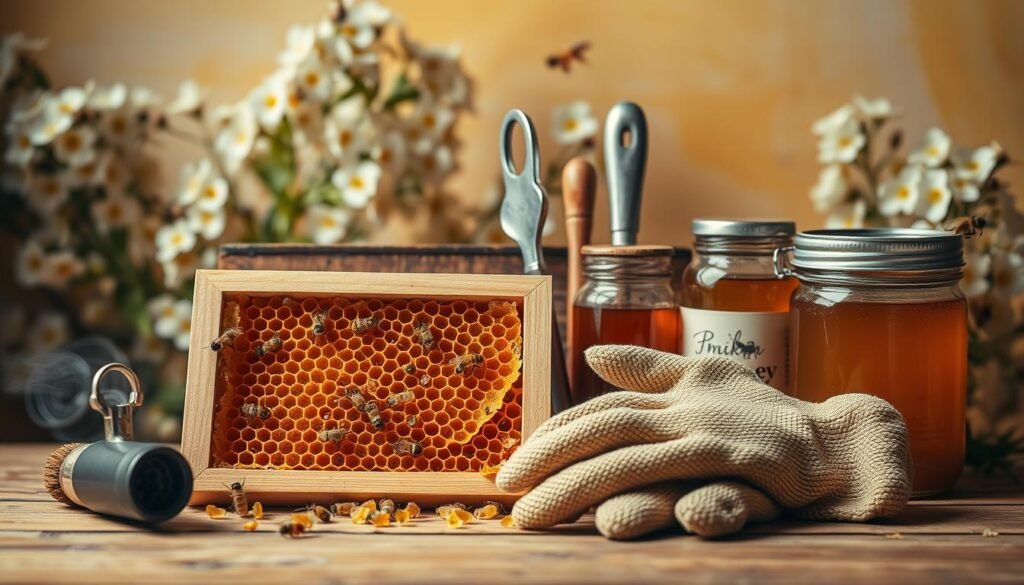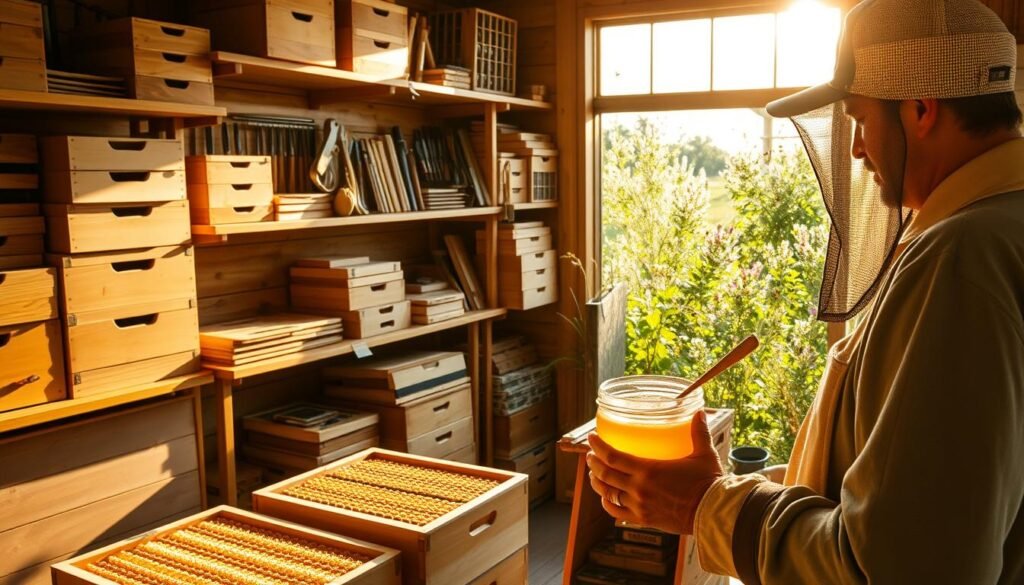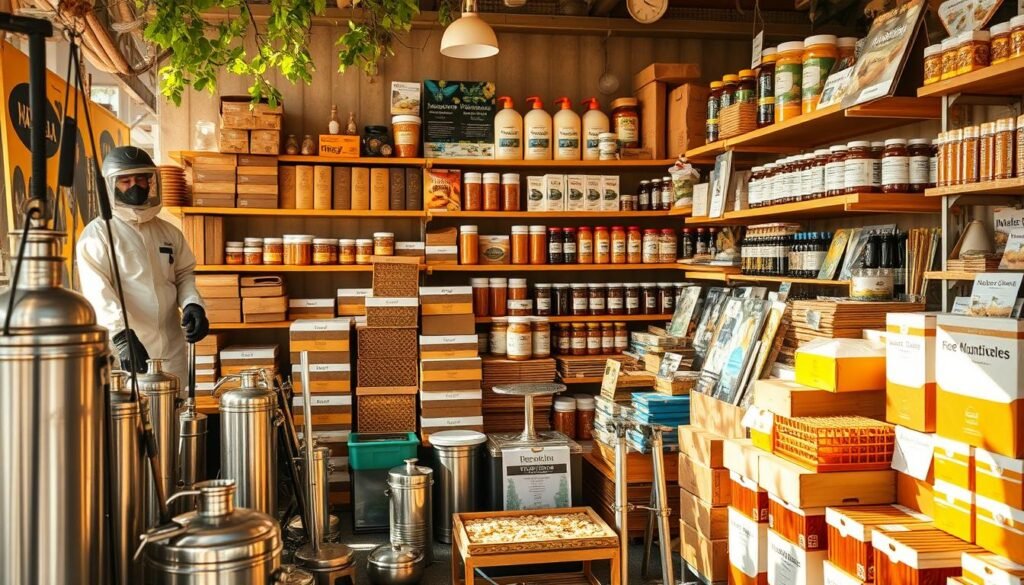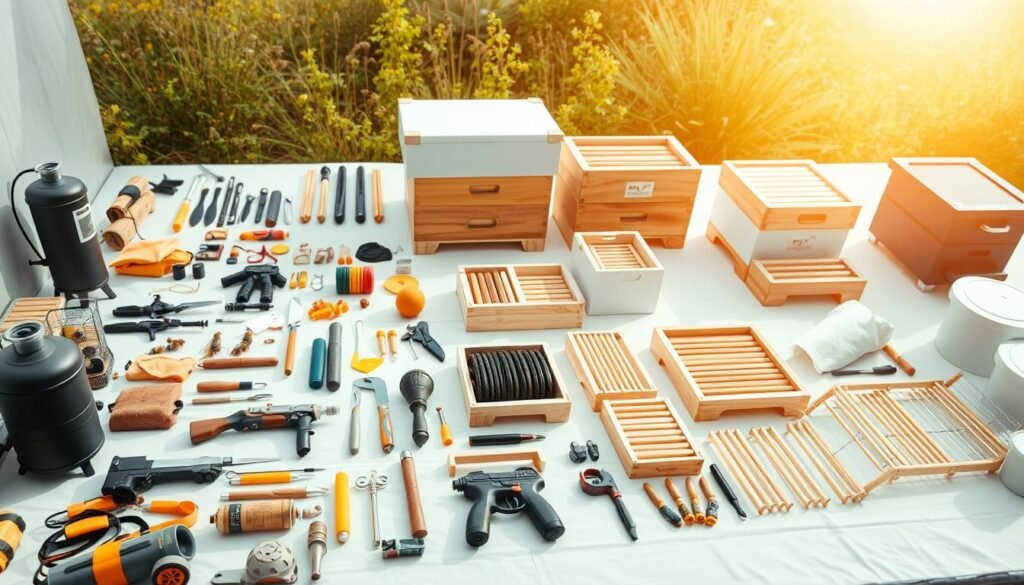Australia’s apiculture community is thriving, with more enthusiasts and professionals seeking reliable tools to maintain thriving colonies. The shift to digital shopping has transformed how beekeepers source essentials, offering everything from hive kits to extraction tools at their fingertips. Durable, climate-adapted gear remains crucial for success in local conditions, whether managing a backyard setup or commercial operation.
Online suppliers now provide curated ranges that balance affordability with robustness. Established brands like Mann Lake, with 40+ years’ expertise, set the standard for quality craftsmanship and community support. Their partnerships in disaster recovery highlight a commitment to sustainable practices – a priority for Aussie beekeepers.
For newcomers, starter bundles simplify the process, while seasoned apiarists appreciate access to specialised tools. Protective wear, smokers, and hive components must meet strict durability benchmarks to withstand harsh summers and variable rainfall. Trusted providers ensure products arrive ready for immediate use, backed by local customer service teams.
Key Takeaways
- Digital platforms offer convenient access to hive management tools nationwide
- Climate-resistant materials are non-negotiable for Australian conditions
- Established brands provide proven solutions for hobby and commercial needs
- Starter kits help newcomers begin their apiculture journey confidently
- Quality assurance and after-sales support differentiate top suppliers
Introduction to Bee Keeping Supplies in Australia
Australia’s varied ecosystems create unique challenges for apiarists, demanding equipment that adapts to subtropical coasts and arid interiors alike. Seasoned professionals and newcomers benefit from specialised tools designed for native flora and regulatory standards.
Overview of the Beekeeping Landscape
From Queensland’s rainforests to Tasmania’s temperate zones, regional conditions dictate hive management strategies. Commercial operators focus on large-scale honey yields, while urban hobbyists prioritise pollinator conservation. Both groups require durable gear that withstands extreme heat, heavy rainfall, and native species’ behaviours.
| Region | Key Considerations | Essential Gear |
|---|---|---|
| Tropical North | High humidity, heavy rainfall | Ventilated suits, rust-proof tools |
| Southern Coast | Cool winters, mixed flora | Insulated hives, varied frame sizes |
| Outback Areas | Low rainfall, high temps | Water feeders, sun-resistant woodware |
Our Commitment to Quality and Service
With 17 years’ experience, we partner with industry leaders like Dadant and Veto-Pharma to deliver tested solutions. Our regional pine woodenware supports local ecosystems while meeting strict durability benchmarks.
Beyond products, we offer climate-specific guidance through workshops and year-round technical support. This hands-on approach helps beekeepers navigate seasonal shifts and maintain thriving colonies.
Why Choose Our Bee Keeping Supplies
Australian apiarists deserve tools that evolve with their craft. Our partnership with global innovators and local artisans creates a balanced selection of equipment built for productivity and longevity. Every item undergoes rigorous testing in diverse climates before reaching customers.
We prioritise materials that outperform standard industry benchmarks. Regional pine hive components resist warping in humid coastal zones, while stainless-steel tools maintain precision through dry inland seasons. This focus on climate-specific durability reduces replacement costs by up to 40% compared to generic alternatives.
Our team combines technical knowledge with hands-on experience. Staff members average 12 years in apiculture, offering practical advice for urban rooftop setups or commercial pollination projects. This expertise translates into personalised equipment recommendations that align with operational goals.
Three pillars define our approach:
- Direct partnerships with 18 certified manufacturers
- Quarterly product performance audits
- Price-match guarantees on essential gear
Over 3,500 Australian apiarists trust our curated range for colony success. From ventilated suits tested in Queensland monsoons to insulated hive wraps proven in Tasmanian frosts, we deliver solutions that adapt to your environment – not the other way around.
Extensive Range of Beekeeping Equipment
Modern apiculture success hinges on using purpose-built tools tailored to specific tasks. Our selection addresses every operational phase, combining innovation with practical design for Australia’s demanding environments.
Hive Kits and Frames
Starter bundles feature climate-tested materials that resist warping and moisture damage. Langstroth designs dominate commercial operations, while top-bar systems suit urban conservationists. Nucleus setups enable easy colony expansion without disrupting existing structures.
Frame systems incorporate precision spacing for optimal comb development. Reinforced foundations and corrosion-resistant wiring ensure five-season durability. Modular components allow custom configurations, adapting to regional flora patterns and hive densities.
Honey Harvesting and Extraction Tools
Efficient processing begins with heated uncapping knives that maintain comb integrity. Radial extractors handle 45% more yield per cycle than manual models, ideal for commercial operations. Dual-stage filtration preserves natural enzymes while removing particulates.
Bottling stations feature food-grade stainless steel with adjustable flow controls. These systems meet export certification standards, crucial for producers supplying international markets. Temperature-controlled storage units prevent crystallisation during transport.
Quality Products for Hobbyists and Commercial Beekeepers
Successful colony management requires precision tools and reliable protection. Both hobbyists and commercial operators need equipment that adapts to their unique workflows while maintaining safety standards. Our range addresses these needs through purpose-built designs tested in Australian conditions.
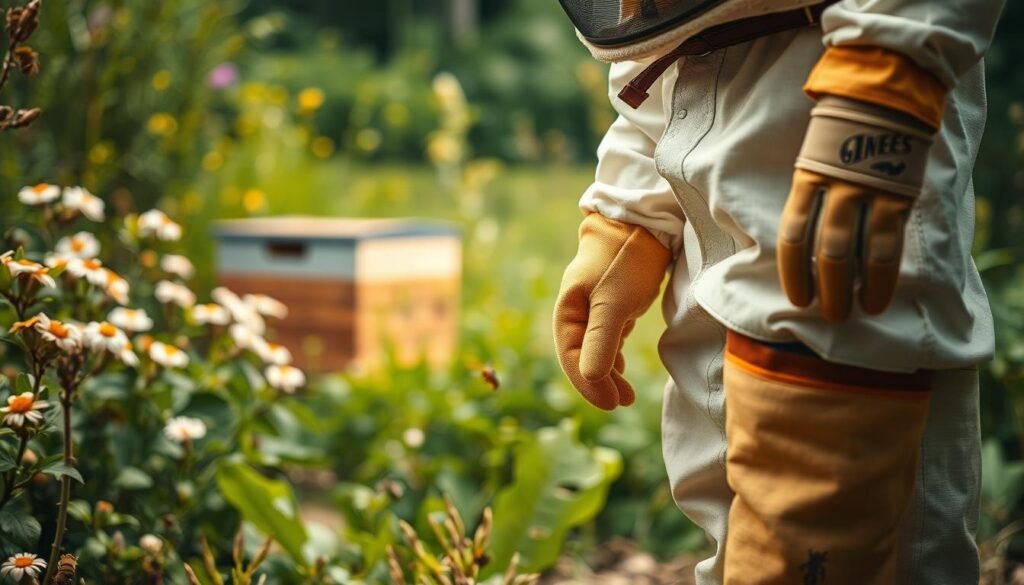
Essential Beekeeping Tools
High-performance implements streamline daily tasks. Hive tools let apiarists separate frames without damaging comb structures. Smokers with adjustable airflow calm colonies during inspections, using native eucalyptus or cardboard fuels. Frame grips and soft-bristle brushes enable gentle handling of worker populations.
Commercial operations benefit from industrial-grade extractors and uncapping tanks. These heavy-duty solutions process 300+ frames daily while maintaining hygiene standards. Hobbyist kits include compact versions for small-scale harvesting.
Protective Gear and Safety Equipment
Full-body suits with triple-stitched seams block stings without restricting movement. Ventilated veils provide 180° visibility, crucial when working with defensive strains. Reinforced gloves combine goat leather palms with elastic cuffs for dexterity during queen rearing.
Commercial teams require suits rated for 8-hour shifts in 40°C heat. These feature moisture-wicking liners and double-layered knee pads. All gear meets AS/NZS safety certifications, with replacement guarantees against seam failures.
- Ultra-light smokers (450g) for rooftop apiaries
- Child-sized suits for junior apiarists
- Anti-fog visors for humid zones
Discover Bee Keeping Supplies for Modern Beekeepers
Modern apiarists blend time-tested methods with cutting-edge technology to maintain healthy colonies. Digital hive monitors now track temperature, humidity, and activity levels in real time, alerting keepers to changes via smartphone apps. These systems reduce manual inspections by 30% while improving colony health insights.
Innovative materials revolutionise traditional tools. Precision-moulded plastic frames resist warping better than untreated wood, lasting up to eight seasons in harsh climates. Ventilated suits with moisture-wicking fabrics keep wearers cool during summer inspections without compromising sting protection.
Leading brands like Mann Lake combine decades of field experience with advanced manufacturing. Their USA-made products incorporate feedback from commercial operators and backyard enthusiasts alike. This collaboration ensures gear adapts to contemporary challenges while respecting sustainable practices.
Three key advancements define modern apiary supplies:
- Remote hive diagnostics with cloud-based data tracking
- Ergonomic tools reducing physical strain during harvests
- UV-stable components for extended outdoor use
These innovations help beekeepers balance productivity with ecological responsibility. Improved designs support natural pollination patterns while simplifying essential maintenance tasks. The result? Healthier colonies and more efficient operations across Australia’s diverse landscapes.
Understanding the Importance of Durable Equipment
Equipment durability shapes long-term success in apiculture. Inferior tools compromise colony health and inflate costs through frequent replacements. Australian conditions demand weather-resistant designs that endure coastal humidity, inland heatwaves, and seasonal downpours.
Materials and Craftsmanship
Country Fields’ 17-year expertise shows in their Nova Scotia pine woodenware. This timber resists warping better than standard pine, maintaining precise hive dimensions. Joints use waterproof adhesives and stainless-steel fasteners – critical for equipment exposed to heavy nectar flows.
Products designed for Australian apiaries undergo stress tests mimicking decade-long use. Ventilation slots align with native bee behaviour patterns. Such craftsmanship ensures tools function flawlessly during peak honey flows or queen-rearing cycles.
Local Sourcing and Sustainability
Regional manufacturing reduces transport emissions while supporting timber communities. Supplies sourced within Australia adapt better to local biosecurity laws and pest pressures. Over 80% of materials in premium kits come from certified sustainable forests.
Products designed with circular principles feature recyclable components. End-of-life hive parts get repurposed into garden planters or wildlife shelters. This approach aligns with eco-conscious practices gaining traction among commercial and hobbyist apiarists alike.
Shipping and Delivery Across Australia
Timely access to apiculture essentials keeps colonies productive and operations running smoothly. Our logistics network delivers to every corner of the country, from Darwin’s tropical north to Hobart’s cooler climates. Specialised carriers handle fragile items with temperature-controlled vehicles where required.
Fast and Secure Delivery Options
Three regional distribution hubs slash transit times while maintaining competitive rates. Urban centres receive orders within 24-48 hours, while remote areas get priority air freight services. Express options cater to urgent needs like swarm management or hive replacements.
Secure packaging protocols protect delicate components during transport. Reinforced cardboard boxes with custom inserts prevent frame warping, while moisture-resistant wraps shield electronic gear. “Our last-minute order arrived intact despite 40°C heat,” notes a commercial apiarist in Broken Hill.
- Real-time tracking updates via SMS/email
- Signature-on-delivery for high-value shipments
- Consolidated deliveries to reduce freight costs
Seasonal demand spikes are managed through advanced inventory planning. This ensures critical tools reach customers before major honey flows or pollination contracts begin. Over 94% of orders ship within 4 business hours during peak periods.
The Beekeeping Experience: From Beginner to Expert
Mastering apiculture requires tools that grow with your skillset. Quality equipment bridges the gap between initial curiosity and professional expertise, adapting to changing colony needs and environmental challenges.

Starter Kits for New Beekeepers
First-time enthusiasts need simplified solutions. Bundled sets include hive components, protective wear, and instructional guides – everything required to establish colonies successfully. Forgiving designs compensate for early mistakes, like removable queen excluders and adjustable frame spacers.
| Feature | Starter Kit | Advanced Tools |
|---|---|---|
| Hive Components | Pre-assembled woodenware | Modular systems |
| Protective Gear | Lightweight suits | Commercial-grade ventilation |
| Tools | Basic smoker & brush | Digital monitoring systems |
| Support | Step-by-step videos | Custom hive configurations |
Advanced Tools for Seasoned Apiculturists
Experienced handlers require precision instruments. Radial extractors process 120 frames hourly, while thermal imaging cameras detect brood patterns. These tools enable large-scale operations without compromising colony welfare.
Progressive learning resources complement equipment upgrades. Many suppliers pair advanced gear with mentorship programs, helping users master swarm control techniques or queen-rearing methods. This skills-and-tools synergy creates confident, capable apiarists ready for any challenge.
How to Get Started with Beekeeping in Australia
New apiarists must navigate local ecosystems and regulations to establish thriving hives successfully. Begin by researching state-specific biosecurity laws, which vary between coastal regions and inland zones. Coastal enthusiasts often require mesh screens to deter invasive pests, while rural keepers focus on water access and shade provisions.
Location determines your equipment needs. Urban setups benefit from compact hives with noise-reduction features, whereas rural operations need predator-proof fencing. Country Fields’ maritime climate guides recommend insulated woodenware for southern coastal areas to handle rapid weather shifts.
Timing your colony launch impacts early success. Install hives during spring nectar flows when floral diversity peaks. This gives bees natural food sources while they adapt to new environments. Avoid winter starts in alpine regions where frosts challenge hive insulation.
Education bridges theory and practice. Combine hands-on workshops with digital resources covering swarm management and disease identification. Many suppliers pair starter kits with mentor contacts, creating support networks for troubleshooting common issues.
Build capacity gradually as skills develop. Start with two colonies to compare growth patterns before expanding. This approach refines your management techniques while keeping initial costs manageable. Seasoned keepers suggest upgrading tools annually based on observed needs rather than buying everything upfront.
Expert Advice and Industry Insights
Mastering apiculture demands more than quality tools – it requires shared wisdom and practical skills. The beekeeping community thrives when newcomers and veterans exchange knowledge about seasonal challenges and innovative techniques.
Workshops and Training Sessions
Dancing Bee Equipment connects apiarists with field-tested methods through hands-on clinics. These sessions cover swarm management in humid climates and comb-building strategies for native flora. Live hive demonstrations let participants test gear while experts provide real-time feedback.
Online Resources and Guides
Their digital library offers step-by-step tutorials for every step of colony development. Video series explain queen rearing in variable climates, while downloadable checklists help prevent common hive errors. Interactive forums foster problem-solving within Australia’s beekeeping community.
Seasoned mentors tailor advice to regional conditions, ensuring equipment choices align with long-term goals. This support system empowers enthusiasts at every step, from backyard setups to commercial pollination contracts.

